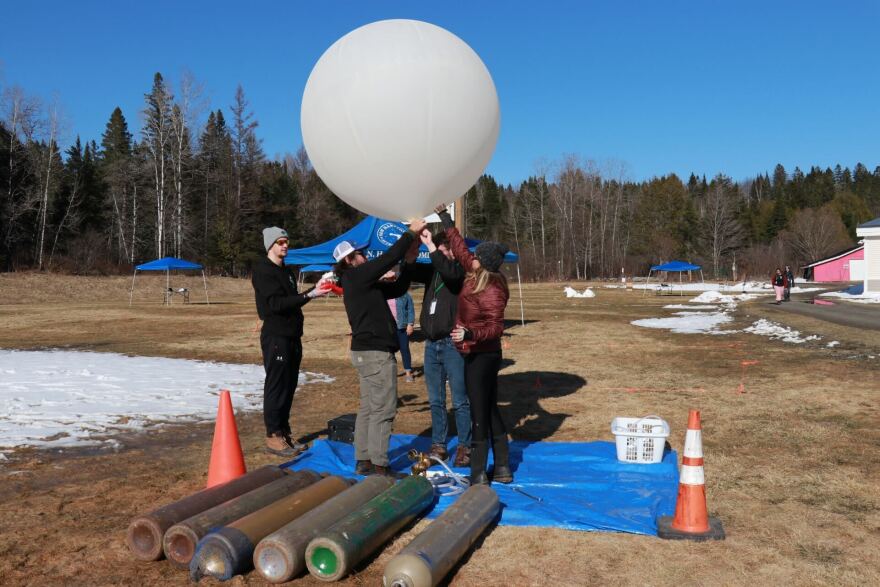Clear, sunny skies and spring temperatures greeted crowds for Monday’s total solar eclipse in Northern New Hampshire. Towns braced for tourists, and highway reports showed stretches of traffic at various points along Interstate 93, Route 16 and Route 3 as people made their way into the path of totality.
NHPR’s Mara Hoplamazian and Zoey Knox spent time in several North Country spots talking with travelers and locals about the day.
Pittsburg

Rob Maier, from San Francisco, planned for a road trip to Texas for the eclipse — but as he saw the weather forecast change, he redirected to Burlington. Then, when the forecast for Coos County was even better, he settled at Lake Francis, in the town of Pittsburg.
He saw the 2017 eclipse in Oregon, which he described as “amazing.” Maier, who was 59 then, had never seen a total eclipse before.
“It goes by so quickly,” he said. “I just wanted to see it one more time. So I thought if there was any chance of doing it, I was going to try to do it this time.”
Ray Markey and his family traveled from Philadelphia. They slept at a rest stop Sunday night but, he says, it was important to them to have a clear view of totality. He experienced 65% totality in 2017.
“It was cool, but everyone says it’ll change your life when you see a full. So, I guess I need my life changed,” he said.

A group of Plymouth State University students and professors have been set up in Pittsburg for a special project. They’ve been launching massive helium balloons every thirty minutes since Sunday afternoon to study temperature, humidity and wind during the solar eclipse. The group is studying how the eclipse impacts the atmosphere across the country.
Meteorology student Maria Cabrera is part of that team, which is funded by NASA. She says Monday’s total eclipse will be her first. She says she started checking piles of books about weather out from the library when she was eight. In elementary school, everyone called her the weather girl.
“I am so excited just to feel what it really feels like for it to go dark for a few minutes, and just to see the moon literally in front of the sun,” she said.
Colebrook
In Colebrook, parking lots were filling up quickly in the morning.
Tim Stevens, Colebrook’s town manager, owns a motel in town, which he says has been fully booked for months. He opened some land up for tents and RVs, too.

Some restaurants in town have extended hours or simplified their menus, and food carts are helping out. He said the infrastructure in town wasn’t meant to accommodate the number of expected tourists.
Stevens said he hadn’t had time to get excited about seeing the eclipse himself. But, he said, having visitors in town is great – and a helpful economic boost during mud season, after a slow winter.
WATCH Zoey Knox's video clip of "totality" below here.

Haley Rossitto sold cotton candy to fundraise for prom and other events at her high school. She used her grandfather’s cotton candy machine, leftover from his time running a carnival.
“I know it’s going to be busy, so I think we’re going to do
good with that. At the same time, it’s a lot of people,” she said. “It’s kind of busy on the Fourth of July, but it’s never like this, never like, people from all over up here.”
Rossitto hoped to make $1,000 from cotton candy sales.
Coleman State Park

Coleman State Park was expecting about 400 visitors Monday. Cars trickled in slowly as traffic backed up roads into Colebrook and Stewartstown.
Diane Matott, a supervisor for New Hampshire State Parks who works at the park, said the day was exciting. The sunshine was a welcome surprise — not something residents expect this time of year in the North Country.
“Not many people know where Coleman State Park is, but they will hopefully now,” she said. “So we look forward to having a lot of people come up.”
The Maples family was visiting Coleman State Park from Danvers, Massachusetts. For 10-year-old Ava Maples, the eclipse made living on Earth feel special.
“If we lived on another planet, we wouldn’t be able to experience this,” she said.
“They have their own versions of celestial changes and interest that would be what we would enjoy if we were aliens, I guess,” replied her mom, Carolyn Maples.
As totality began, Ava described the sight as “amazing.”
“I have no words for it, honestly,” she said. “I can start to see stars.”
Even though it was cold – researchers with the Mount Washington Observatory said the temperature dropped 15 degrees throughout the eclipse – Ava said it was worth the shivers.
People watching in Coleman State Park experienced about three minutes of totality, and eclipse watchers cheered as the sun re-emerged from behind the moon.
Amanda Stokley Vierling and her daughter traveled from Maryland to see totality with some friends. She said feeling the temperature drop, watching the sky go dark, and seeing stars during the day was surreal.
“That was the coolest thing I’ve ever experienced in my life. Absolutely worth every penny every moment, every hour on the highway. It was amazing,” she said. “There’s no words for it.”
Her daughter, Katie, was thrilled by the experience.
“What was so extraordinary to me was particularly just being able to look directly at the sun with just my eyes. It felt, like, so one-on-one, it was like this weird intimacy with the sun, of all things,” she said. “And then I was like, bouncing and squeaking and stuff, because, raw emotion.”

NHPR's Mara Hoplamazian and Zoey Knox reported from Stewartstown for this story.




